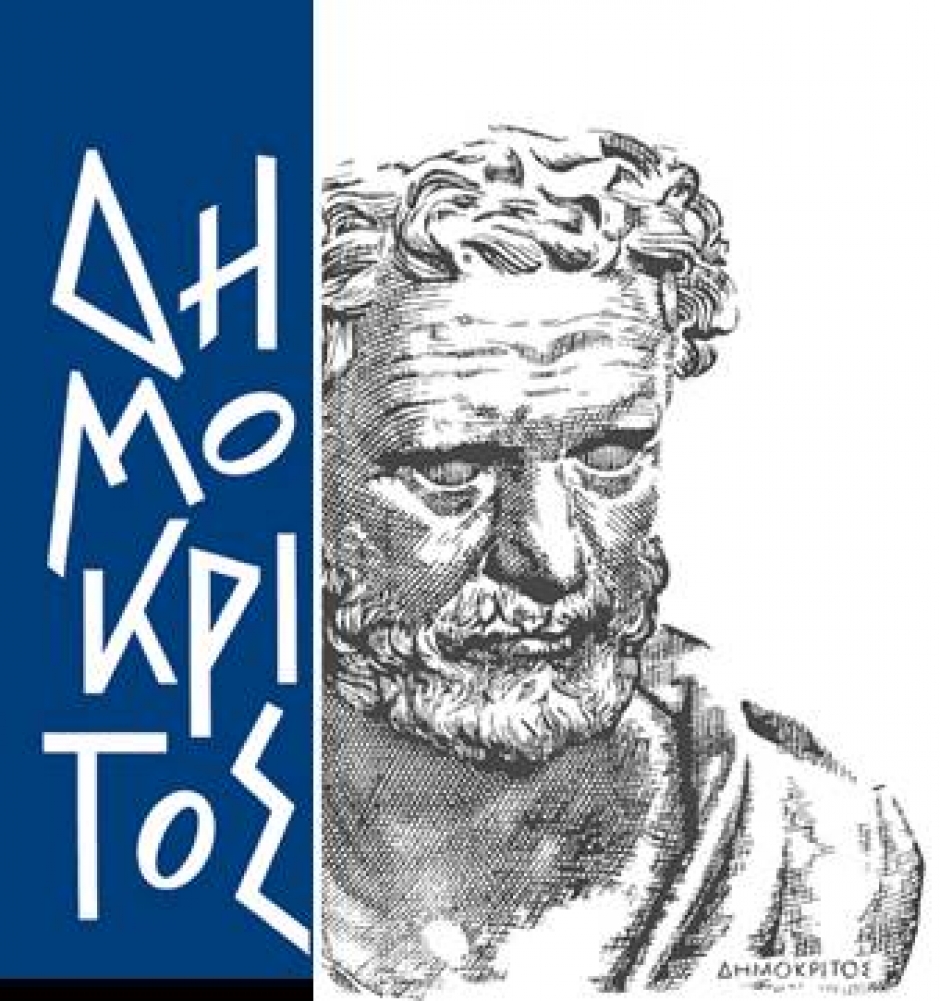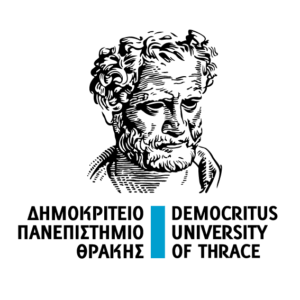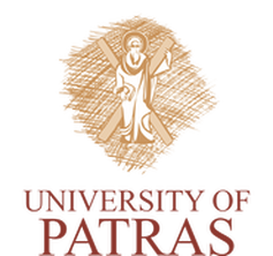National Centre for Scientific Research "DEMOKRITOS"
Lab of Nanotechnology and Microsystems
 The National Center for Scientific Research “Demokritos” (NCSR “Demokritos”) is the largest multidisciplinary
research center in Greece, with critical mass in expertise and infrastructure in the fields of Nanotechnology,
Energy & Environment, Biosciences, Particle and Nuclear Science, Informatics and Telecommunications.
The Center was inaugurated in 1961 as a state-owned entity under the name Nuclear Research Center “Demokritos”,
following the coming into operation of the nuclear reactor research facility. The development of the nuclear
reactor introduced a cutting-edge technology to Greece, signifying a major turning point in the development
of large-scale research infrastructures and the first step towards the establishment of a national Research
and Technology policy.
In 1985, it has been renamed as National Center for Scientific Research “Demokritos” and became an
autonomous Legal Entity of Public Law supervised by the General Secretariat for Research and Technology
(GSRT), while preserving its administrative and financial independence.
The NCSR “Demokritos” conducts world-class basic and applied research, for advancing scientific knowledge
and promoting technological development in selected areas of national socio-economic interest. The Center
also plays a pivotal role in graduate education and professional training and its unique infrastructure is
employed for high-technology services to the Industry and the Society.
The NCSR “Demokritos” has contributed significantly and in many ways to:
The National Center for Scientific Research “Demokritos” (NCSR “Demokritos”) is the largest multidisciplinary
research center in Greece, with critical mass in expertise and infrastructure in the fields of Nanotechnology,
Energy & Environment, Biosciences, Particle and Nuclear Science, Informatics and Telecommunications.
The Center was inaugurated in 1961 as a state-owned entity under the name Nuclear Research Center “Demokritos”,
following the coming into operation of the nuclear reactor research facility. The development of the nuclear
reactor introduced a cutting-edge technology to Greece, signifying a major turning point in the development
of large-scale research infrastructures and the first step towards the establishment of a national Research
and Technology policy.
In 1985, it has been renamed as National Center for Scientific Research “Demokritos” and became an
autonomous Legal Entity of Public Law supervised by the General Secretariat for Research and Technology
(GSRT), while preserving its administrative and financial independence.
The NCSR “Demokritos” conducts world-class basic and applied research, for advancing scientific knowledge
and promoting technological development in selected areas of national socio-economic interest. The Center
also plays a pivotal role in graduate education and professional training and its unique infrastructure is
employed for high-technology services to the Industry and the Society.
The NCSR “Demokritos” has contributed significantly and in many ways to:
- The advancement and world-wide recognition of the Hellenic research activity
- The development, diffusion and transfer of high quality know-how to public and private sectors
- The reversal of high-caliber scientific brain drain
- The provision of highly qualified research personnel to the Greek academic community as well as to the Greek Industry
Research activities are currently coordinated by five (5) Research Institutes:
- Institute of Informatics & Telecommunications
- Institute of Biosciences & Applications
- Institute of Nuclear & Radiological Sciences & Technology, Energy & Safety
- Institute of Nanoscience & Nanotechnology
- Institute of Nuclear & Particle Physics
Democritus University of Thrace (DUTh)
Department of Electrical and Computer Engineering
Lab of Electronics
 Democritus University of Thrace (DUTH) was established in
July 1973 by Legislative Decree No. 87 of 27 July 1973, and
started operating during the academic year 1974-1975. It
was named "Democritus" in honor of the ancient Greek
philosopher Democritus, who hailed from the town of Abdera
in Thrace.
The administration of DUTH is headquartered in Komotini,
which is the capital city of the Administrative Region of
Eastern Macedonia and Thrace.
The University is currently operating eight Faculties and
nineteen Schools in four cities of Thrace - eight in Komotini,
five in Xanthi, four in Alexandroupolis and two in Orestiada.
Overall, more than 15,000 students are studying at DUTH at
undergraduate and post-graduate level.
The University plays an important role in strengthening the
national and cultural identity of the region of Thrace, and
contributes to the high level of education in Greece. Relying
on the quality of teaching and research level, DUTH has
secured a place among the best Greek Universities.
As a Higher Education Institution, DUTH is a Public Entity
with complete autonomy that is supervised and funded by
the State through the Ministry of Education, Research and
Religious Affairs.
DUTH has participated/ is currently participating in several
EU-funded programmes, such as FP7 actions: (27; of which
4 are MSCA), H2020 actions: (10; one of which is a MSCA
and another two are in the Grant Preparation Phase), JUST
Action Grants: (2), Life actions: (1), Erasmus+ actions: (2),
Jean Monnet Chair (1) etc. Furthermore, the University is
participating in several bilateral and multilateral
cooperational programmes such as Transnational
Cooperation Programmes “MED”,"Black Sea","Balkan
–Mediterranean" and cross-border European Territorial
Cooperation Programme “Greece-Bulgaria” etc., as well as
national ones".
Democritus University of Thrace (DUTH) was established in
July 1973 by Legislative Decree No. 87 of 27 July 1973, and
started operating during the academic year 1974-1975. It
was named "Democritus" in honor of the ancient Greek
philosopher Democritus, who hailed from the town of Abdera
in Thrace.
The administration of DUTH is headquartered in Komotini,
which is the capital city of the Administrative Region of
Eastern Macedonia and Thrace.
The University is currently operating eight Faculties and
nineteen Schools in four cities of Thrace - eight in Komotini,
five in Xanthi, four in Alexandroupolis and two in Orestiada.
Overall, more than 15,000 students are studying at DUTH at
undergraduate and post-graduate level.
The University plays an important role in strengthening the
national and cultural identity of the region of Thrace, and
contributes to the high level of education in Greece. Relying
on the quality of teaching and research level, DUTH has
secured a place among the best Greek Universities.
As a Higher Education Institution, DUTH is a Public Entity
with complete autonomy that is supervised and funded by
the State through the Ministry of Education, Research and
Religious Affairs.
DUTH has participated/ is currently participating in several
EU-funded programmes, such as FP7 actions: (27; of which
4 are MSCA), H2020 actions: (10; one of which is a MSCA
and another two are in the Grant Preparation Phase), JUST
Action Grants: (2), Life actions: (1), Erasmus+ actions: (2),
Jean Monnet Chair (1) etc. Furthermore, the University is
participating in several bilateral and multilateral
cooperational programmes such as Transnational
Cooperation Programmes “MED”,"Black Sea","Balkan
–Mediterranean" and cross-border European Territorial
Cooperation Programme “Greece-Bulgaria” etc., as well as
national ones".
University of Patras (UoP)
Department of Physics
 The University of Patras was founded in the city of Patras in
1964 and it began functioning in the Academic year of
1966-67, this contributed vastly to the decentralization of
Academic Education in Greece. In June 2013 the University
of West Greece was incorporated in the University of Patras.
The University is a two-city campus, situated both in Patras
and Agrinion. The campus in Patras is located 12 km East of
the city of Patras, in the suburb Rion, covering a vast area of
2.656 acres. The campus is a self-contained campus
located at the foot of Mount Panachaico with a view over the
Gulf of Corinth and the mountains of Central Greece across
the water.
The University of Patras is the third largest University in
Greece regarding the size of student potential, the Faculty
Members, Administrative Personnel, number of
departments, and accredited student titles.
The University of Patras includes 24 Departments, with a
large number of sectors and consequently a great range of
disciplines, which operate 112 laboratories and 14 fully
equipped clinics.
The University of Patras has 28,727 Undergraduate and
3,959 Postgraduate students, a total of 727 faculty
members, 146 Teaching and Technical staff and 457
Administrative Personnel. (data of September 2013)
Besides its distinguished path in education, the University of
Patras has excelled in the fields of Basic and Applied
Research. The University of Patras has acquired
international prominence for pioneering wide ranging
Research in areas such as Environment, Health,
Biotechnology, Mechanics, Electronics, Informatics and
Basic Science. A number of the Departments, Laboratories
and Clinics have been designated as Centres of Excellence,
on the basis of International Assessment. The University of
Patras has a reputation for quality and innovative research
and presents an effective participation in a plethora of
Research Projects, Scientific Organizations, and Research
Groups.
The University of Patras was founded in the city of Patras in
1964 and it began functioning in the Academic year of
1966-67, this contributed vastly to the decentralization of
Academic Education in Greece. In June 2013 the University
of West Greece was incorporated in the University of Patras.
The University is a two-city campus, situated both in Patras
and Agrinion. The campus in Patras is located 12 km East of
the city of Patras, in the suburb Rion, covering a vast area of
2.656 acres. The campus is a self-contained campus
located at the foot of Mount Panachaico with a view over the
Gulf of Corinth and the mountains of Central Greece across
the water.
The University of Patras is the third largest University in
Greece regarding the size of student potential, the Faculty
Members, Administrative Personnel, number of
departments, and accredited student titles.
The University of Patras includes 24 Departments, with a
large number of sectors and consequently a great range of
disciplines, which operate 112 laboratories and 14 fully
equipped clinics.
The University of Patras has 28,727 Undergraduate and
3,959 Postgraduate students, a total of 727 faculty
members, 146 Teaching and Technical staff and 457
Administrative Personnel. (data of September 2013)
Besides its distinguished path in education, the University of
Patras has excelled in the fields of Basic and Applied
Research. The University of Patras has acquired
international prominence for pioneering wide ranging
Research in areas such as Environment, Health,
Biotechnology, Mechanics, Electronics, Informatics and
Basic Science. A number of the Departments, Laboratories
and Clinics have been designated as Centres of Excellence,
on the basis of International Assessment. The University of
Patras has a reputation for quality and innovative research
and presents an effective participation in a plethora of
Research Projects, Scientific Organizations, and Research
Groups.
Foundation of Research and Technology-Hellas (FORTH)
Institute of Chemical Engineering Sciences (ICE-HT)
 The Institute of Chemical Engineering Sciences (ICE-HT) was
established and began operating at Rio-Patras in 1984 as
an independent academic institute.
In 1987 ICE-HT was incorporated into the structure of the
Foundation of Research and Technology-Hellas (FORTH).
This comprises of a network of six institutes that report
directly to the General Secretariat of Research and
Technology of the Ministry of Education, Research and
Religious Affairs.
The new identity which ICE-HT assumed by its incorporation
into FORTH, gave rise to higher operational flexibility and
further expansion within the framework of its original aims.
In addition to fundamental research, the Institute currently
conducts applied and technological research in a great
variety of fields and provides specialized services to
industry.
The Institute of Chemical Engineering Sciences (ICE-HT) was
established and began operating at Rio-Patras in 1984 as
an independent academic institute.
In 1987 ICE-HT was incorporated into the structure of the
Foundation of Research and Technology-Hellas (FORTH).
This comprises of a network of six institutes that report
directly to the General Secretariat of Research and
Technology of the Ministry of Education, Research and
Religious Affairs.
The new identity which ICE-HT assumed by its incorporation
into FORTH, gave rise to higher operational flexibility and
further expansion within the framework of its original aims.
In addition to fundamental research, the Institute currently
conducts applied and technological research in a great
variety of fields and provides specialized services to
industry.
Lobachevsky State University of Nizhny Novgorod (UNN)
 Lobachevsky State University of Nizhni Novgorod (UNN) consists of 5 institutes – Institute of International
Relations and World History (IIRWH), Institute of Economics and Entrepreneurship (IEE), Institute of Biology
and Biomedicine, Institute for Postgraduate and Doctoral Studies and Institute of Military Training – as well
as 14 faculties – those of Chemistry, Radio physics, Physics, Mechanics and Mathematics, Computational Mathematics
and Cybernetics, Philology, Law, Social Sciences, Physical Education and Sports, Preparatory Faculty, Faculty for
International Students, Faculty for Regional Personnel Training, Minor Academy of Public Administration and
Advanced School of General and Applied Physics.
Lobachevsky State University of Nizhni Novgorod (UNN) consists of 5 institutes – Institute of International
Relations and World History (IIRWH), Institute of Economics and Entrepreneurship (IEE), Institute of Biology
and Biomedicine, Institute for Postgraduate and Doctoral Studies and Institute of Military Training – as well
as 14 faculties – those of Chemistry, Radio physics, Physics, Mechanics and Mathematics, Computational Mathematics
and Cybernetics, Philology, Law, Social Sciences, Physical Education and Sports, Preparatory Faculty, Faculty for
International Students, Faculty for Regional Personnel Training, Minor Academy of Public Administration and
Advanced School of General and Applied Physics.
Kurchatov Institute (KI)
 NRC «Kurchatov Institute» has congregated the research capacities, technological potential and human resources
essential for the advancement in new branches of science and technology. The development and implementation of
leading-edge technologies based on unique research and mega-facilities and complexes are the top priorities of
NRC «Kurchatov Institute». Since its foundation, Kurchatov Institute has been pursuing a full cycle oriented
interdisciplinary approach – from fundamental research to ready for use technologies.
NRC «Kurchatov Institute» has congregated the research capacities, technological potential and human resources
essential for the advancement in new branches of science and technology. The development and implementation of
leading-edge technologies based on unique research and mega-facilities and complexes are the top priorities of
NRC «Kurchatov Institute». Since its foundation, Kurchatov Institute has been pursuing a full cycle oriented
interdisciplinary approach – from fundamental research to ready for use technologies.